Berlin, 31.08.2017
For outstanding commitment
The European Tolerantia Awards 2017
The European TOLERANTIA AWARDS 2017 are presented as joint prizes by SOS homophobie (France), Lambda-Warszawa and Kampania Przeciw Homofobii (Poland), The Rainbow Project (Northern Ireland), Pink Cross (Switzerland) and MANEO (Ger-many). Laureates of the Tolerantia Awards 2017 are: Heiko Maas, Federal Minister of Justice and Consumer Protection (Germany), Stéphane Corbin, singer and composer, and Océane Rosemarie, singer, comedienne and actress (France), Elżbieta Szczęsna, founder and honorary chair of the Akceptacja (Acceptance) association of families and friends of LGBT* people, Chris Hudson, Minister at All Souls Non-Subscribing Presbyterian Church in South Belfast (Northern Ireland), and Alan David Sangines, activist in refugee work (Switzerland).
The Tolerantia Awards, which have been presented annually since 2006, honours the outstanding engagement of people, institutions and groups. Their commitment highlights democratic values such as equal rights, solidarity, social diversity and tolerance as well as action against homophobia, racism and all forms of group-focused enmity in their own countries, in Europe and beyond.
The awarding organisations are members of the European Alliance Against Homophobia (Berlin Alliance), which was founded by organisations from Germany, France and Poland in Berlin in 2005. The Rainbow Project from Northern Ireland joined the alliance in 2014 and Pink Cross from Switzerland became a member in 2016. The organisations work together to combat discrimination and prejudice-motivated violence, advise and support victims of homophobic and trans*phobic violence, and promote social enlightenment and basic democratic values in their own countries and in Europe. The basis of the alliance is the Tolerancja Declaration, which has been signed by all members.
Germany
Heiko Maas, Federal Minister of Justice and Consumer Protection
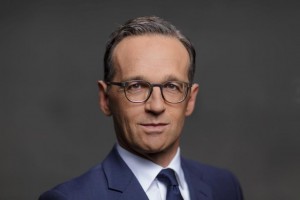
In 2014, Heiko Maas was the first Federal Minister of Justice to state clearly that the German state had “incurred a great burden of guilt” as a result of Paragraph 175 of the German Criminal Code, which was abolished without replacement just 20 years ago, and that victims convicted under this unjust paragraph in both German states, even after 1945, would be rehabilitated. In 2014, he had invited contemporary witnesses to meet with him so that he could speak to those affected directly. He described the talks as “moving and depressing hours in Germany’s judicial history”. “They were prosecuted, punished and ostracised merely because of their love for men, because of their sexual identity.”
Heiko Maas didn’t hold back from admitting that even a constitutional state can be wrong. “The state is guilty of having made life difficult for so many people,” he said. “Paragraph 175 of the German Criminal Code was unconstitutional from the start. The previous convictions are unjust. They are a deep wound in the human dignity of all those sentenced. We will never be able to redress these shameful acts committed by the constitutional state completely, but we want to rehabilitate the victims. The homosexual men convicted should no longer have to live with the stigma of having been convicted.” He added: “It beggars belief that it took until 1994 for this unspeakable standard to be abolished completely.” Heiko Maas made it clear that: “Paragraph 175 has blocked professional paths, destroyed careers and wiped out biographies. Justice should finally be secured for the few victims still living today.” And as Justice Minister he saw that it was now a matter of “rehabilitating victims during their lifetimes”.
We acknowledge the clear position and unambiguous words of Federal Justice Minister Heiko Maas, under whose direction the draft law “to criminally rehabilitate persons convicted of performing consensual homosexual acts after 8 May 1945”, amended on 22 June 2017, has been passed. For this reason, we award him our TOLERANTIA AWARD 2017.
Alongside Heiko Maas, we also acknowledge the many people who previously, and tirelessly, campaigned for the rehabilitation of the homosexual men convicted, and for appropriate compensation for them. Thanks to the commitment of Germany’s federal states and under the auspices of the State of Berlin, the Bundesrat (German federal council) introduced initiatives in 2012 and 2015. They included expert reports and the legal opinion by Hans-Joachim Mengel (2012) and the legal opinion by Prof. Dr. Martin Burgi (2016), which was commissioned by the Federal Anti-Discrimination Agency and recommended the collective rehabilitation of the victims via an Act of Annulment.
The adoption of National Socialist “law” unchanged into West German and initially also East German criminal law had devastating consequences for homosexual men. They were freed from National Socialism on 8 May 1945, but not from persecution: they were hounded and stigmatised in both new German states. In the German Democratic Republic, homosexuality was decriminalised in 1968; in the Federal Republic of Germany, it was gradually decriminalised from 1969 onwards until full legalisation in 1994. In 2002, the Bundestag (German federal parliament) overturned any convictions made during the Third Reich and agreed to compensate victims, but the persecution of homosexual men had continued even after 1945 and the convictions against homosexual men in both successor states still stood. Up until the abolition of Articles 175 and 175a of the Criminal Code in 1994, around 64,000 men were convicted under these paragraphs, 50,000 up to 1969 alone – in approximately 100,000 criminal investigations. Concealment of one’s sexual orientation and the fear of being discovered thus continued to be part of the everyday lives of homosexual men. It wasn’t just the convictions that destroyed victims’ lives and families, however, as in many cases the investigations themselves led to social death.
The German federal government justified the annulment of final judgements, which would normally contradict the rule of law, on the basis that “the criminal prohibition of homosexual acts is today held to be notably in conflict with basic rights”. Despite critical voices, all political parties welcomed the draft law. All parties represented in the Bundestag now see the convic-tions as unjust.
The resolution of the Bundestag on 22 June 2017 means that the homosexual men convicted will now finally be rehabilitated. They will also receive financial compensation: a EUR 3,000 lump sum plus another EUR 1,500 for every year of detention begun.
The previous laureates from Germany were: Volker Beck, member of the German Parliament for the Green Party, and Günter Dworek, activist in the gay and lesbian movement (2006); The “Human Rights and Sexual Identity (MERSI)” group of Amnesty International (2007); Tanja Walther, sports scientist, Philipp Lahm, captain of the German national football team, and Dr. Theo Zwanziger, president of the German football federation DFB (2008); Hans-Wolfram Stein, teacher in Bremen (2009); Wieland Speck and Mabel Aschenneller, producers of the international LGBT-Film Award TEDDY (2010); Lala Süsskind, Chairperson of the Jewish Community of Berlin (2011); Elfi Scho-Antwerpes, Mayoress of Cologne (2012); Maria Sabine Augstein, lawyer and trans*-activist (2013), Cornelius “Corny” Littmann, entrepreneur, entertainer, theater owner (Schmidt Theater) and former President (2002 to 2010) of Hamburg’s football club FC St. Pauli (2014), Klaus Wowereit, Governing Mayor of Berlin 2001-2014 (2015), The Protestant Church in Berlin, Brandenburg and Silesian Upper Lusatia (EKBO), the Protestant Church in Hesse and Nassau (EKHN) and the Protestant Church in the Rhineland (2016).
Contact: Bastian Finke, Director of MANEO;
Mail: bastian.finke@maneo.de oder maneo@maneo.de / home: www.maneo.de
France
Stéphane Corbin and Océane Rosemarie
This year, SOS homophobie has decided to laureate two persons.
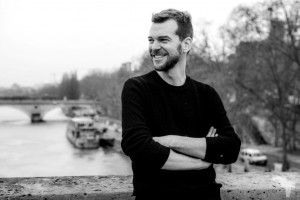
Stéphane Corbin is a French composer and singer. As he says, he was born in March “with this sweet taste of melancholy from the end of winter and the hope that spring brings”. After a pretty solitary childhood, “a little apart from the others”, quickly comes the music. After 2 albums (Optimiste, 2004, and Les murmures du temps, Sony 2011), he composes for others.
In 2012, the French Parliament debates on a bill
allowing marriage for same-sex couples. During several months, big demonstrations against gay marriage took place all over the country. Face to this dramatic situation for French LGBT and their allies, Stéphane Corbin imagined and set up a music show to fight against homophobia. He created “Les Funambules” (The Tightrope walkers). 400 artists united to fight against homophobia, in a double album of 42 songs never released before. These songs are written in order to fight stereotypes on homosexuality, LGBT couple and their families. They invite people to think about homophobia. Stéphane Corbin believes that Art can change the world, make it less homophobic. During 2017 and 2018, while Les Funambules will continue their journey in Paris and touring, several new projects will see life.
SOS homophobie has decided to laureate Stéphane Corbin because his work is a beautiful and efficient way to fight against LGBTphobia. Music and shows are a powerful way to rise awareness on dramatic consequences of homophobia. Stéphane Corbin’s lyrics help people to be more open and inclusive regarding LGBT people. He actively fights against homophobia.

Océane Rosemarie is a French singer, humorist, actress and director. After 3 albums, in 2009, Océane Rosemarie creates her first one-women show intitled “La lesbienne invisible” (The invisible lesbian). It is real success. For 4 years and a half Océane Rosemarie goes across France and around 40.000 spectators see her performance.
In 2011, she meets the producers Nolita Cinema and her associate, Cyprien Vial, and they decide to write a movie: “Embrasse-Moi !” (Kiss me). It is a romantic comedy showing Océane Rosemarie and her love life. Océane Rosemarie has been also on stage for 3 years with “Chatons violents” (Violent kittens), her new one-women show. Océane Rosemarie’s performances and her movie all deal with stories of women who love women.
SOS homophobie has decided to laureate Océane Rosemarie because she is an amazing artist who deals with topics related to women who love women. In the movie Kiss me! Océane Rosemarie show love stories between her and other women, normalizing and highlight a topic too rarely handled in movies: llove between women. Océane Rosemarie fight the phenomenon of invisibility of lesbian, which remain an issue. Through her one womans shows and her movie “Embrasse moi!”, Océane Rosemarie actively pushes forward inclusion of lesbians and LGBT people in the French society.
The previous laureates from France were:
Dr. Louis-George Tin (2006), LGBT*- and Anti-Racism-activist, founder of the IDAHOT; the play Place des mythos/ Delusion Square, a musical comedy (2007); Bruno Solo, journalist, and actor, producer of TV series “Caméra café” and “Kaamelott” (2008); Paris Foot Gay soccer club (2009); Caroline Mécary, lawyer (2010); Olivier Dussopt, PS (Parti Socialiste), members of the French National Assembly and Franck Riester, UMP (L’Union pour un mouvement populaire), members of the French National Assembly (2011); Véronique Eledut, teacher at Lycée JB Corot in Paris (2012); Le Petit Journal, a daily TV news show hosted by Yann Barthès (2013); “www.projet17mai.com”, a collaborative website presenting cartoons against homo-phobia in France (2014), Irène Théry, sociologist, member of the ‘Haut Conseil de la Famille’ (2015), Amnesty International France (2016).
Contact: Joël Deumier, president
Mail: sos@sos-homophobie.org / home: www.sos-homophobie.org
Poland
Elżbieta Szczęsna
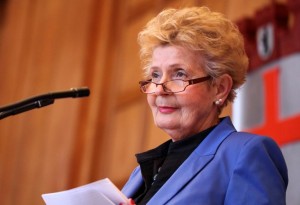
Retired chemistry teacher, fired from work at the beginning of martial law in Poland. She cooperated with underground publishing as a translator of the German-language press. From 1989 to 2007 she worked at the Senate Intervention Office – the Upper Chamber of Polish Parliament.
In 2007, she created in Warsaw a group for LGBT parents; In 2013 she co-founded the Association “Akceptacja” (Acceptance) Association of Families and Friends of LGBTs. Until 2017 she acted as a President of the Board. Currently shy is an Honorary President. For her work she was awarded in 2013 a Respect Price.
Lambda Warszawa and Campaign Against Homophobia (KPH) decided to honour Elzbieta Szczęsna for her overall commitment to human rights and in particular for initiating and developing the first group of LGBT parents in Poland. Her personal experience and commitment has allowed hundreds of people across the country with lesbian, gay or transgender children, to contact and support each other and to exchange experience. The work of Elżbieta Szczęsna in this field also led to the creation of the first Polish Association of Parents and Families of LGBT people – “Akceptacja”, which is an active player of Polish civil society.
For her outstanding contribution to LGBT society and human rights Lambda Warszawa and Campaign Against Homophobia (KPH) have the pleasure to announce Elżbieta Szczęsna a Polish laureate of the 2017 Tolerance Award.
The previous laureates from Poland were: Kazimierz Kutz, Senator in the Polish Senate (2006), Piotr Pacewicz, journalist and civil-rights activist (2007), Marzanna Pogorzelska, teacher (2008), Prof. Zbigniew Hołda, Helsinki Foundation for Human Rights (2009), Izabela Jaruga-Nowacka, posthum, former vice primier of Poland; she died at the age of 59 on 10.04.2010 as a passenger in an air-crash in Smolensk (2010), Adam Bodnar, LL.M., Ph.D., Head of the Department of Legal Affairs at the Helsinki Foundation for Human Rights (2011), Dr. Katarzyna Bojarska, Professor at the Institue of Psychology of the University of Gdansk, and „No Taboo”, the Psychosexual Health Centre in Gdansk (2012), Ewa Siedlecka, journalist (2013) and Professor Monika Płatek, Institute of Criminal Law of the University of Warsaw (2014), Ewa Wanat, radio journalist and television personality (2015). Ilona Łepkowska, screenwriter, member of the Polish Film Academy, president of Television Association ‘Serial’ (2016)
Contact:
Lambda Warszawa (Lambda Warsaw):
Krzysztof Kliszczyński, Mail: kkliszczynski@lambdawarszawa.org;
Kampania Przeciw Homofobii (Campaign Against Homophobia): Chabar,
Mail: achaber@kph.org.pl
Northern Ireland
Chris Hudson
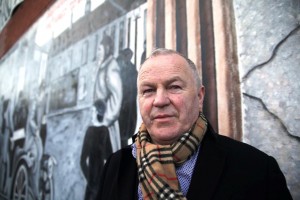
Chris Hudson is the minister for All Soul’s Non-Subscribing Presbyterian Church in South Belfast. Over the past 15 years, Chris has become well known to the LGBT people of the city because of his courage and grace in standing in solidarity with the community to promote their inclusion and respect within society.
In Northern Ireland, tensions frequently arise between religious belief and the rights of LGBT people. The largest political party, the Democratic Unionist Party (DUP), in particular, relies on the religious beliefs of its membership to limit the ability of LGBT people to participate in Northern Ireland society. This is not merely limited to opposition to marriage equality, but opposition to every right and protection which has been won by the community over the past thirty years.
It has, therefore, been a great sign of hope and change for the community to have such a vocal and passionate ally in Chris Hudson. Chris has been a powerful speaker in favour of the inclusion of the community in all aspects of our society, even when, at times, he has been speaking on his own. This is a sign of his courage and his ability to create a space for LGBT people of faith in his congregation, which is now the site of the annual Belfast Pride prayer service.
Chris has been forthright in his views that homophobia and transphobia are not Christian values and has publicly called on the DUP to relinquish its veto on marriage equality in Northern Ireland saying: “I hope soon that we will have a power -sharing executive and an assembly up and running again. So I want to make a particular appeal to the Democratic Unionist party not to use a petition of concern. I ask them kindly and in all sincerity not to do it because I know many people who vote DUP yet still support marriage equality. The DUP discriminates against some of their own voters … They should simply allow for a free vote on a simple majority basis the next time we have a pro-equality motion coming forward in the assembly.”
As someone who has been and continues to be a staunch ally of the LGBT people of Northern Ireland, The Rainbow Project is delighted to nominate Chris Hudson to be our Tolerantia Laureate for 2017.
The previous laureates from Northern Ireland were: Máirtín Ó Muilleoir, member of the Northern Ireland Assembly, SF, Lord Mayor of Belfast from 2013-2014 (2015), Marry Mc Aleese, President of the Republic of Ireland [1997-2011] (2016).
Contact: Gavin Boyd, Policy and Advocacy Manager
Mail: gavin@rainbow-project.org / home: www.rainbow-project.org
Switzerland
Alan David Sangines
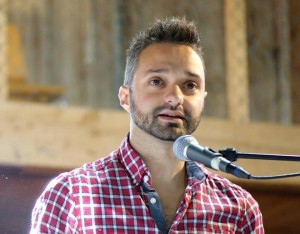
Alan David Sangines, 31, was born in Bolivia and grew up in Zurich Switzerland. He has studyied law and is working with refugees. He is also a member of the city council of Zurich since 2010 and is since 2012 vice president and responsible for politics of the Zurich pride festival.
Has always been very devoted in fighting for LGBT rights, specially for the rights of minorities within the LGBT community. His first steps were supporting LGBT-refugees in Switzerland through a human rights organization. 2012 – 2016 he was president of the LGBT-organization within his party (social democrats of Switzerland), where he always fought to make sure LGBT-issues stay top priorities for the agenda of his party. In 2012 he became Vice-President and political responsible of the Zurich Pride festival, the biggest LGBT-festival in Switzerland, where he fought for years, to put the political aspect of Zurich pride back into the focus, instead of the party focus. During his time at Zurich pride, it became much more political, prioritzing the politcal aspect of pride.
Alan has always been a fearless, forceful advocate for LGBT-rights and specially for minorities within the LGBT-community. He has worked thorugh party lines with different organizations as well as corporations to achieve equality for LGBTs in different aspects. Whenever political debates about LGBT-issues are going on, he is one of the first political persons the media calls. His blunt blogs about LGBT-issues lead to public debates and coverage by the general media. He has been invited to many public debates, has given a lot of interviews to various newspapers and newschannels and radio stations, where he has always been outspoken fighting for full LGBT-equality.
His focus on (LGBT)-refugees has educated a lot of people within and outside the LGBT community of their difficult situation which sometimes tends to be forgotten. In that sense he was never afraid to raise the issue of racism and discrimination of refugees, foreigners and other minorities within the LGBT-community fearlessly facing heated debates and even backlash. He was also responsible for dedicating the political slogan of Zurich Pride 2017 to the situation of LGBT-refugees, which lead to nationwide debates and media coverage about the situation of LGBT-refugees.
Therefore we would like to acknowledge his determination and effectiveness fighting for full equality of LGBTs. Furthermore, we acknowledge his dedication to fight for minorities within the LGBT community, such as refugees.
The previous laureates from Switzerland were: Florian Vock und Jazzmin Dian Moore, LGBT*-ASctivists (2016)
Contact person: Bastian Baumann, Secretary-General
Mail: bastian.baumann@pinkcross.ch
Home: www.pinkcross.ch
